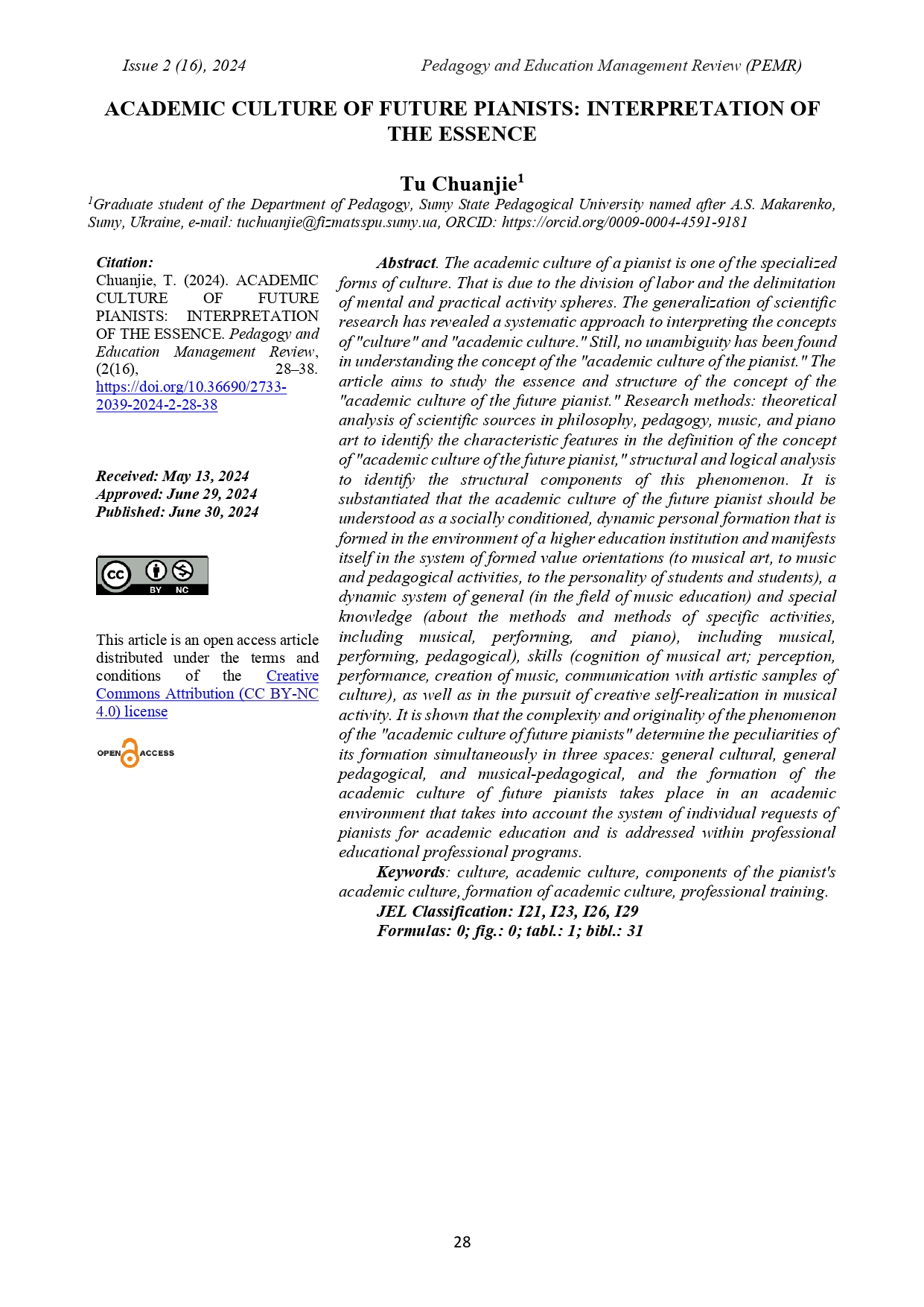ACADEMIC CULTURE OF FUTURE PIANISTS: INTERPRETATION OF THE ESSENCE
DOI:
https://doi.org/10.36690/2733-2039-2024-2-28-38Keywords:
culture, academic culture, components of the pianist's academic culture, formation of academic culture, professional trainingAbstract
The academic culture of a pianist is one of the specialized forms of culture. That is due to the division of labor and the delimitation of mental and practical activity spheres. The generalization of scientific research has revealed a systematic approach to interpreting the concepts of "culture" and "academic culture." Still, no unambiguity has been found in understanding the concept of the "academic culture of the pianist." The article aims to study the essence and structure of the concept of the "academic culture of the future pianist." Research methods: theoretical analysis of scientific sources in philosophy, pedagogy, music, and piano art to identify the characteristic features in the definition of the concept of "academic culture of the future pianist," structural and logical analysis to identify the structural components of this phenomenon. It is substantiated that the academic culture of the future pianist should be understood as a socially conditioned, dynamic personal formation that is formed in the environment of a higher education institution and manifests itself in the system of formed value orientations (to musical art, to music and pedagogical activities, to the personality of students and students), a dynamic system of general (in the field of music education) and special knowledge (about the methods and methods of specific activities, including musical, performing, and piano), including musical, performing, pedagogical), skills (cognition of musical art; perception, performance, creation of music, communication with artistic samples of culture), as well as in the pursuit of creative self-realization in musical activity. It is shown that the complexity and originality of the phenomenon of the "academic culture of future pianists" determine the peculiarities of its formation simultaneously in three spaces: general cultural, general pedagogical, and musical-pedagogical, and the formation of the academic culture of future pianists takes place in an academic environment that takes into account the system of individual requests of pianists for academic education and is addressed within professional educational professional programs.
Downloads
References
Andreev A.S. Personal growth: purposefulness and spontaneity. Psychological problems of self-realization of the individual. 2013. Issue 14. P. 121-130.
Bourdieu P. Practical Reason: On the Theory of Action, Cambridge: Polity, 1998. 153 p.
Chun Ch. Methodology of formation of acmeological culture of future music teachers in the process of vocal and choral training: diss. ... candidate ped. Nauk: 014. Kyiv, 2021. 236 p.
Djiraro Mangue C. L., Gonondo J. Academic Culture and Talent Cultivation: The Chinese Experience. Journal of Comparative & International Higher Education, 2021. No. 13(1). pp. 133–150. https://doi.org/10.32674/jcihe.v13i1.3133.
Fedan O. Theoretical approaches to the problem of self-development of the personality, 2017. URL: https://lib.iitta.gov.ua/709003/1/Teoretychny%
podhody%20to%20problems%20self-development%20personality.pdf
Fentsyk O. M. Formation of academic culture of students in the process of research activity. URL: http://www.innovpedagogy.od.ua/archives/2020/28/48.pdf
Gnezdilova K. M. Corporate culture of a higher school teacher: teaching method. Manual. Cherkasy: Bohdan Khmelnytsky National University, 2013. 124 p.
Jing Liu. Methodology of formation of concert performance competence of foreign master's students in the process of professional (piano) training. Collection of scientific papers. Issue 1, 2017. C. 266-273.
Khoruzhiy G. F. Academic culture: values and principles of higher education. Ternopil: Bohdan textbook, 2012. 320 p.
Kolyada E.K., Kalinovska I.M. Academic culture of the researcher and the implementation of the communicative strategy of tolerance in English-language academic writing. New Philology, 2022. No. 85. P. 131-137. https://doi.org/10.26661/2414-1135-2022-85-18.
Limin V. Formation of vocal culture among students of art institutes on the basis of artistic traditions Youth and the market. 2011. No. 10. P. 159–162.
Revutska S. K., Zinchenko V. M. Academic writing: study guide. Kryvyi Rih: DonNUET, 2019. 130 p.
Semenikhina O. Akademichna kultura: komparatyvnyi analiz pidkhodiv do interpretatsii poniattia. Zhurnal «Perspektyvy ta innovatsii nauky» (Seriia «Pedahohika», Seriia «Psykholohiia», Seriia «Medytsyna»), 2024. № 3(37). S. 590-599. https://doi.org/10.52058/2786-4952-2024-3(37)-590-599.
Semichenko V. A. The problem of personal development and self-development in the context of continuous professional education. Pedagogy and psychology, 2010. No. 2 (67). P. 46-57.
Standard of higher education of Ukraine. Field of knowledge 02 Culture and art. Kyiv, 2019. URL: https://mon.gov.ua/storage/app/media/vishcha-osvita/zatverdzeni%20standarty/2021/07/28/025-Muz.mystetstvo-bakalavr.28.07.pdf
Sukholenova O. G. Stages of personality self-development. Psychology. K., 2000. Vol. 2 (9). Part 1. P.98-104.
Teacher I.B. Category "Formation of pedagogical skill of a teacher of professional training" in modern psychological and pedagogical theory. Pedagogy of formation of a creative personality in higher and universal schools: coll. of science pr. / editor. : T. I. Sushchenko (chief editor) and others. Zaporizhzhia, 2012. Vol. 26 (79). P. 389–395.
Tkachenko T. Teoretyko-metodychni osnovy formuvannia vokalno-zvukovoi kultury maibutnoho vchytelia muzyky u protsesi profesiinoi pidhotovky : avtoref. dys. ... dokt. ped. nauk : 13.00.04 / T. Tkachenko ; nauk. konsultant V. Andrushchenko ; Nats ped. un-t im. M. P. Drahomanova. Kyiv, 2010. 43 p.
Ustimenko-Kosorich O. A. Pedagogical innovations in the training of accordionists in primary and secondary musical institutions of Serbia. Scientific journal of the National ped. M. P. Drahomanov University. Ser. 14. Theory and methods of art education: coll. of science works Vol. 18 (23). Kyiv: NPU named after M. P. Drahomanov, 2018. P. 259–263.
Zhang Jiaohua. Intonation as a factor of meaning creation in piano performance. Dissertation for obtaining the scientific degree of candidate of art history in specialty 025 - musical art. Sumy State Pedagogical University named after A. S. Makarenko. Sumy, 2020. 201 p.







